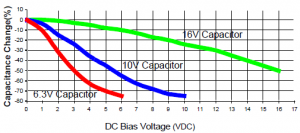Multilayer ceramincs are great for applications where voltage is constant (ie. you are smoothing off a voltage). However they are not good for use inline for AC voltages (i.e. audio and AC signal filters). The reason is that ceramic capacitors will give a piezo electric effect to an AC signal, which causes noise. For audio use a Poly of some type (Polypropelene is best for audio signal pass through).
X7R, X5R
Better than Z5U and Y5V. Typically maintain a capacitance range within +-20% of nominal over the full operating voltage and temperature ranges. As a result they are typically larger and more expensive than Z5U and Y5U types.
Z5U, Y5V
Capacitance drops off severely with applied voltage. A typical Z5U or Y5V capacitor can loose 60% of its rated capacitance with half the rated voltage applied to it.
Z5U and Y5V also exhibit a severe temperature effect loosing more than 50% of nominal capacitance and the top and bottom ends of the temperature range.
Ceramic Capacitor Naming
Class 1
NPO, COG
Most stable
Class 2
Less stable
1st Character – Low Temperature
X = -55ºC
Y = -30ºC
Z = +10ºC
2nd Character – High Temperature
4 = +65ºC
5 = +85ºC
6 = +105ºC
7 = +125ºC
8 = +150ºC
9 = +200ºC
3rd Character – Tolerance
P = +/-10%
R = +/-15%
S = +/-22%
T = +22 / -33%
U = +22 / -56%
V = +22 / -82%
Capacitance Variation With Voltage
In addition to temperature tolerance, the effective capacitance of large value ceramic capacitors can vary substantially based on the applied DC voltage. This effect can be very significant, and is often overlooked or not documented well.
When selecting a ceramic capacitor where this is a concern (e.g. for a voltage regulator) select a high-voltage rating so that the operating voltage is a small percentage of the maximum rated capacitor voltage. E.g. for a 1.8V voltage regulator in a IC, select say a 16V ceramic capacitor.
